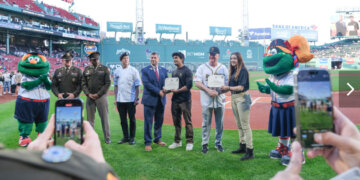Army National Guard Staff Sgt. Trillitye Paullin can still remember the exact pitch and timbre of her newborn daughter’s screams.
Baby June was only 1 month old in 2015 when her parents discovered her tiny body covered in eczema and her diaper full of blood. Her parents rushed her to the hospital, where doctors determined their firstborn had severe infant food allergies.
“Your breast milk is killing your baby,” they told Paullin.
Nearly 5% of children 5 years old or younger have food allergies, according to Johns Hopkins Medicine. And a 2008 Centers for Disease Control and Prevention study found that food allergies among children were on an upward trend.
Round one
No one knew for sure what in Paullin’s breast milk was causing the problem – especially since there was no way to test for the precise allergen(s) June was reacting to. Tests are currently designed for those ages 6 months and older. So the new mother went on a strict allergen-elimination diet, avoiding foods like dairy, seafood and nuts in the hopes of eventually nursing June again.
It worked. Supplemented by special formula, mom and daughter resumed breastfeeding two weeks later and continued until June’s first birthday. But the situation was far from ideal.
Paullin, an engineering technical specialist with the 878th Engineer Company of the North Carolina National Guard, had limited dietary and nutritional options for almost a year in her quest to nourish her baby.
“It had a lot of implications for my physical and mental health,” Paullin said.
She hoped things would be different when her second daughter was born in 2018. But Rose followed in her big sister’s allergy footsteps.
“There was a lot of turmoil and trauma around my thoughts, like I don’t know if I can do this again by myself; I don’t know if I’ll survive,” she said. “There was a lot of sadness around the fact that I knew I was going to be buckling up for another journey.”
But this time, Paullin fought back — and used her civilian background and military-tested determination to do so.
Protein allergen test
Paullin, a North Dakota native, joined the National Guard in 2005. When she earned her Ph.D. in cellular and molecular biology in 2016, she focused on proteomics (the study of proteins). She knew the root cause of infant food allergies stems from specific reactions to food proteins — so why couldn’t she create a test to figure out which proteins?
“I don’t believe in chances,” Paullin said. “I absolutely think what happened was a perfect storm between my Ph.D. specialty in protein analysis and my kiddos, who both experienced food reactivity.”
At the time, Paullin was working as a quality assurance manager for a dairy processing facility. If she could check for cross contamination in cow milk there, she reasoned, shouldn’t she be able to do the same for human milk elsewhere?
A few weeks after Rose was born, Paullin launched Free to Feed, a biotechnology research company hoping to release in October the world’s first patented allergen detection test kit for human milk. It will be available over-the-counter, Paullin said, to make it easily accessible for new parents. Free to Feed also offers one-on-one consultations, conducts research studies and provides caregiver education and milk-sharing opportunities.
“I want Free to Feed to provide parents with the tools they need to make educated decisions about their baby’s allergies,” Paullin said. “And give them all the love and empathy they deserve along the way.”
Today, June and Rose are ages 8 and 5 — and completely allergy-free. Paullin, in fact, is the only one in the family with any sort of allergies.
She looks back on everything — joining the National Guard, deploying to a combat zone, the thousands of hours poured into her Ph.D., a civilian job testing cow milk, learning to be a soldier and a mother, her daughters’ food struggles, the frustration and tears before the breakthroughs — and wishes she would have given herself more grace.
But if the Army has taught her anything, she said, it’s that this, too, shall pass, if you keep soldiering onward.
“When you finally get to the source of your child’s food allergies, it’s like you finally get to meet your baby because their real personality begins to emerge,” she said. “Like, ‘Oh, this is the little human I’ve brought into the world.’”













































